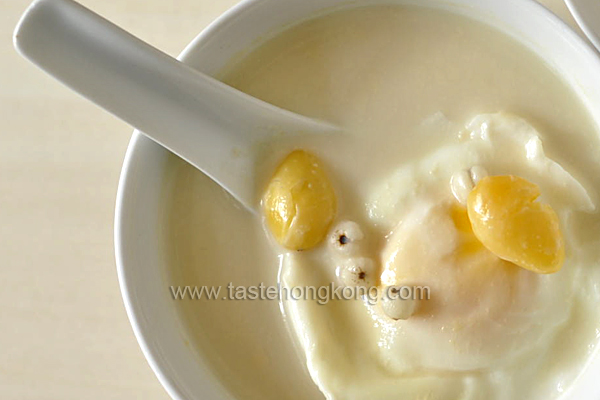
Not only due to a promise in my last post, but also because I particularly love making this classic Chinese dessert when climate turns cooler and drier. So I am here again to share a common way of preparing this sweet soup, also one of the most popular dessert here in Hong Kong, called 白果腐竹薏米糖水 in Chinese .
The beancurd skin, aka yuba or also commonly known among Chinese as tofu skin, used for making this dessert is the dried one. It is made from heated soy bean milk in a large open vessel for forming the skin after which it is dried. Carolyn Jung, author of foogal.com, has a wonderful shot here capturing the moment when a piece of yuba is just readily prepared .
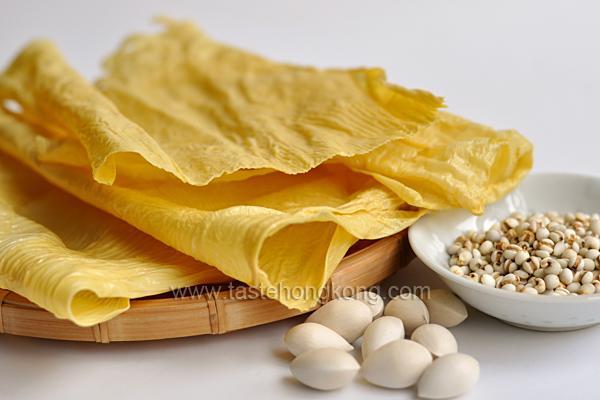
I think we drink more sweet soups in the drier seasons, believing them having the ‘moisturizing’ properties. This soup tastes very like soy bean milk yet it also has a unique sweetness from the ginkgo nuts and a nutty flavor from the job’s tears, though both of their tastes are far more subtle than the beans.
We also like to have this dessert as a ‘cooling’ agent possible for tampering the ‘heat’ in our bodies. Barbecued foods, hot pot meals, or deep-fried dishes are all ‘heated’ items, yet they are among our favorite items in autumn and winter!
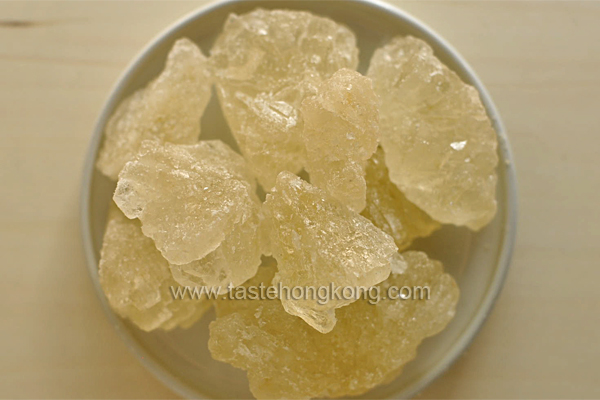
- Ingredients
- Job’s tears are not recommended for pregnant women and ginkgo nuts must be thoroughly cooked; you may want to read a little bit more of them particularly if they are new to you (click details below).
- 150g dried beancurd skin (yuba)
- 10 ginkgo nuts >>details
- 2 tbsp job’s tears (coix seed) >>details
- 70g rock sugar, or to taste
- 2-4 eggs, optional
- ~2 1/2 liters water
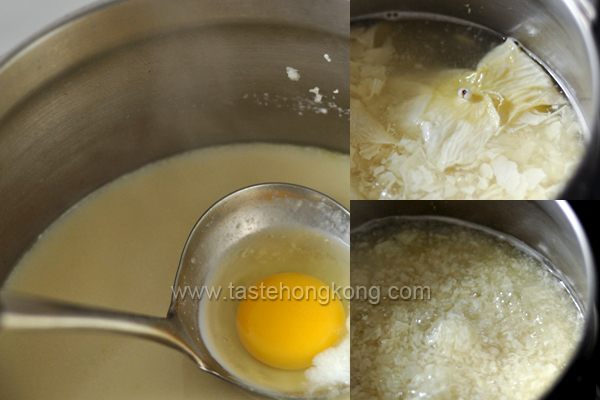
Method
Rinse job’s tears and soak in water for about an hour. Discard water. Shell ginkgo nuts like this.
Bring about 2.5 liters of water in a pot to a boil. Over medium heat, put in job’s tears, shelled ginkgo nuts and dried beancurd skins.
Give some gentle stirs to avoid the ingredients sticking to the bottom. The beancurd skins shall start breaking down into small pieces in a couple of minutes.
Cover, but leave the lid slightly opened to avoid spilling over (having a stockpot large enough to prevent overflow is thus preferred).
Add in rock sugar when the soup almost reaches your desired consistency, about 30 minutes.
Gently ladle shelled eggs into the boiling soup one by one.
Serve hot after the sugar is dissolved and the eggs are cooked.
Variations
It is also common that the beancurd skins are briefly cooked to retain a silken texture like boiled wonton wrappers. In that case, you may need to make sure both the ginkgo nuts and job’s tears are thoroughly cooked first, roughly 30 minutes, (and also sugar is dissolved) before adding the beancurd skins to boil for another 3 to 5 minutes. Keep a closer look at the yuba; remove it immediately from heat as soon as it reaches your desired size. Mine disintegrated really fast. They had turned from larger pieces into rather smaller ones soon after I took a shot – Too slow I am!
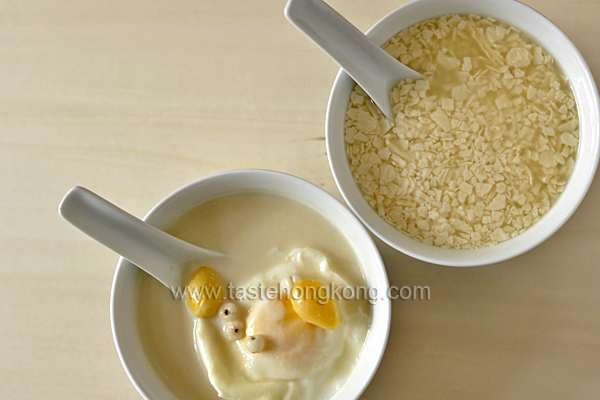
- Category: Featured . Nut and Seed . Tofu (Beancurd) .
- 36 comments
To get immediate updates and new recipes from my blog, you may also SUBSCRIBE them via RSS feeds. See you there.
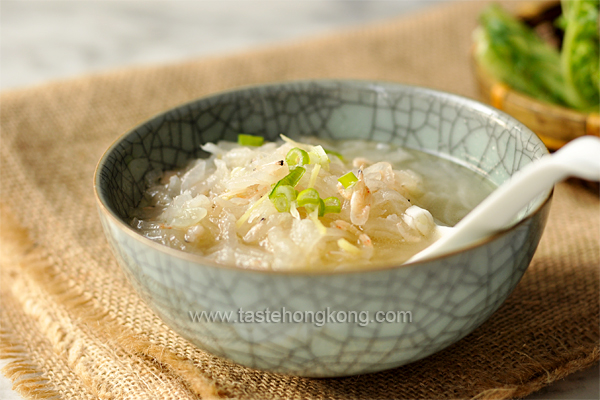
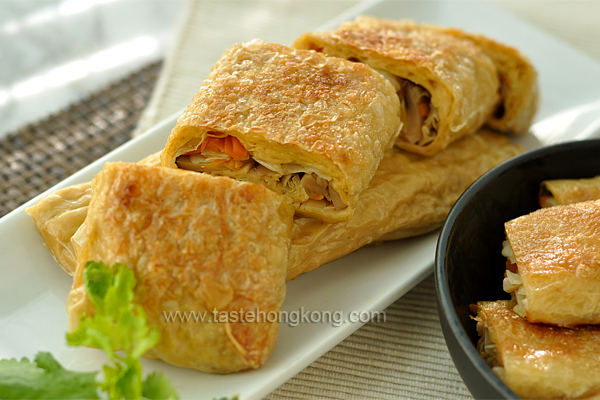
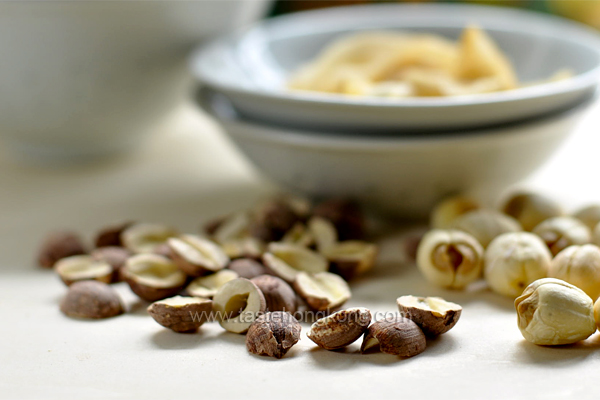
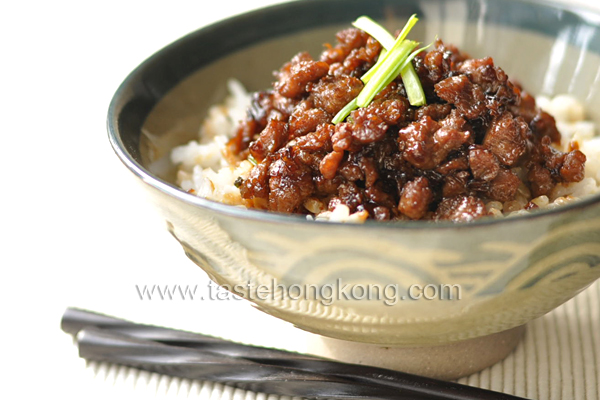
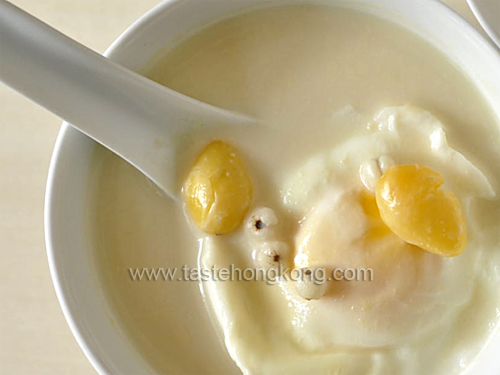
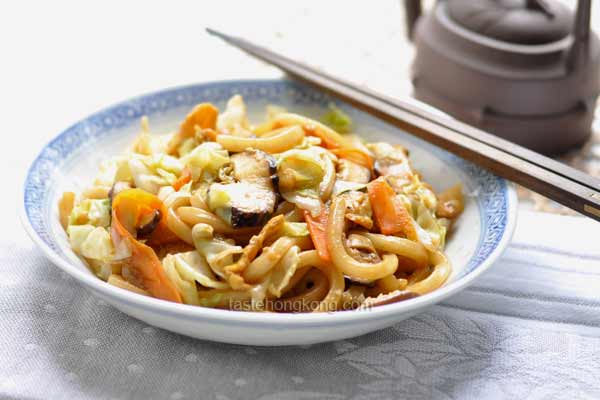
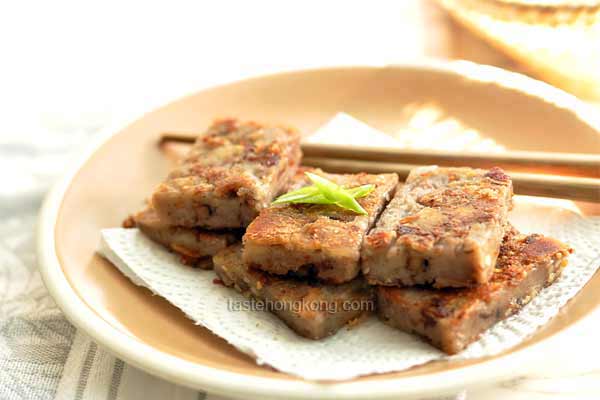
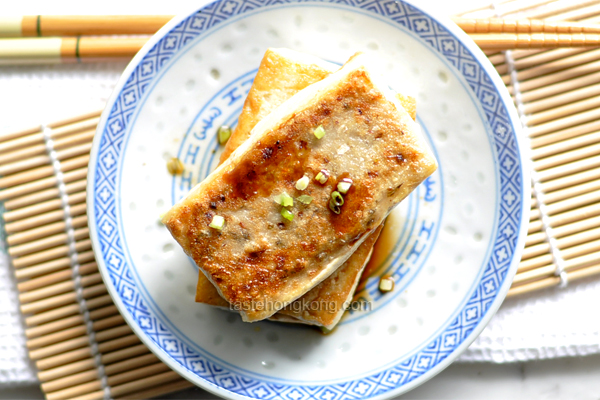
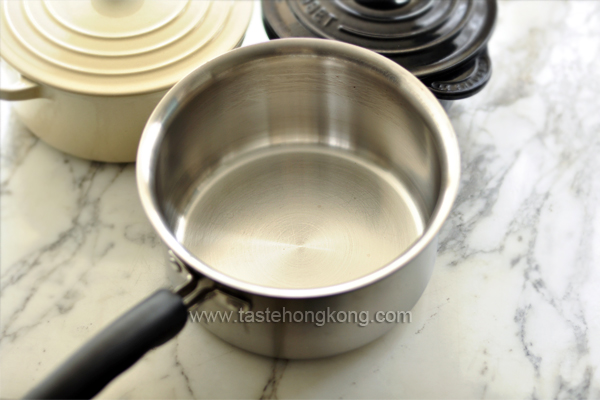
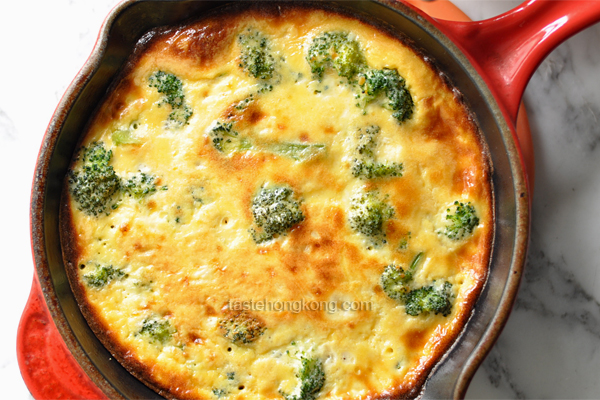



I miss this dessert so much. Thanks for the reminder 🙂
Nice sweet dessert. The one I have is just fu chuk and yee mai, no ginkgo nut nor egg.
Haven’t had this in a long time! oh and I didn’t know the little seeds are called job’s tear, cool name.
Do you know how to make the tofu curd dessert in ginger tea? I would love a recipe for that!
This is my favourite Chinese dessert. Your pic reminds me of my childhood times with my dear father. Miss him very much.
@Cheese Goddess,
So far as I know, the traditional Chinese way of making tofu custard is prepared by mixing soy bean milk with a coagulant, the gypsum powder. The mixing is actually a skillful pouring and it is best to do that in a wooden barrel.
If I’m to make the custard at home, I’ll probably use other ingredients for coagulating the bean milk.
I love this dessert but mine still has chunks of the 腐竹. I like your version where they are mostly disintegrated, must try it some time 🙂
I love this dessert. One of my favourites. Over here, we don’t eat them with eggs. And I guess one can substitute normal eggs with quail eggs?
I have never tried this dessert. Soup for dessert interesting.
@Mei Teng,
That sounds to be a creative idea though I’m not a fan of quail eggs.
Sometimes we cook the eggs by hard boiling and shell them before adding to the sweet soup, which I believe would also be suitable for preparing the small quail eggs.
Enjoy!
I have tried many dishes made of beancurd skin while I lived in HK for 3 years, but I don’t think I ever tried the one as a soup. I do love ginkgo nuts. Koreans use them in soups and dessert as well. Nice job!
What caused the dessert to turn “milky”? (the bowl of dessert with egg). Is there any soy milk in there? Been raining and cold these few days, this is such a perfect dessert.
@tigerfish,
No, not any hidden soy milk here, may I assure you : ).
The milky-looking soup are mainly from the melted yuba. I suppose fresh yuba made purely from soy beans should easily be disintegrated after appropriate boils (and thus causes the soup to turn milky).
Less amount of water also makes the soup look creamier.
Wow, I am amazed with fresh yuba. 🙂
This is definitely my kind of dessert, although I never had it with egg…so interesting.
What a fascinating soup. I dont think I’d find most of these ingredients here in the UK, but I’d love it if you made this for me… pretty please? 😀
*kisses* HH
@Heavenly Housewife,
Be my guest, please : ).
I love this dessert soup and somehow after drinking this, I feel more nourished too and soothed 🙂
Mmm I love yuba. This looks absolutely delicious!
This is one of my favorite dessert soups. I’ll have to make some. Or ask my mom to.
This is absolutely one of my favourites. Love your recipes and blog.
Thank you so much for this recipe, and this blog! <3
[…] ‘soep’ van deze ginkonootjes, tofuvellen en Chinese parelgort (Job’s tears): zoete gingkosoep (白果腐竹薏米糖水) Share this:Vind ik leuk:LikeWees de eerste om post te waarderen. […]
Nice looking dessert. 🙂
I’ve tried it at home a couple of times, but I can’t seem to get the beancurd skins to disintegrate completely. I always have tiny bits of skins floating in the soup. I’ve tried varying the boiling time by leaving it on for a much longer time with no success 🙁
Any tips on what to look out for when buying the skins? Or other advice perhaps?
@Ling,
Thanks!
I suspect that it might be due to the quality of the beancurd sheets or them being stored for too long. Am afraid there is not a solution I know. An alternative I’d suggest is to have homemade soy milk, which takes longer to prepare but it is worth the effort.
A rough guideline is to look for ones that are recently produced (longer expiry date might mean the presence of preservatives) and with no additives. And, consume them fresh.
Hope this gives you some hints.
Nice, this is delicious dessert. I like it so much!!
Thank you for your little tips in your recipes. They indeed makes a difference!
@Eliza,
You are welcome! Am glad that they can be of help.
Enjoy!
i love the taste of this dessert! thanks for posting. your blog is fabulous! i am also finding that the skins don’t break down quickly enough. i just bought the skins yesterday (manufactured date was may 2012) and it has no preservatives. any suggestions? should i soak them first? they are only starting to break down after an hour of boiling!
thanks very much!
@xlb,
The dried beancurd skins used for making this sweet soup does not need to be soaked before boiling. They should start breaking down in minutes and give you a pleasant soy flavor after cooked. Hope you could locate fresher yuba next time, if possible, produced within a month.
Good luck and enjoy!
thanks for your quick response! i’ve already made another batch. while the beancurd skins broke into smaller pieces, they didn’t break down into liquid. will try with fresher skins next time, if i can locate them here in san francisco.
by the way, i love the fragrance and texture of chinese almonds. can i substitute the gingko nuts for them?
much appreciation!
@xlb,
Excuse me for being late this time. Yes, feel free to substitute and enjoy your almond-flavored soy milk.
There are two types of Chinese almonds, so you may use a mix of both of them like this or use only south almonds like this.
Enjoy!
Love ur blog! I’m an ABC (Australian Born Chinese) with parents from Hong Kong & have been looking for traditional Hong Kong recipes to cook. Even though my mum is an excellent cook to learn from, it’s also good to have recipes that I can browse online & try out too. I love this dessert… will have to try it out!
@Andrea,
Enjoy! I’d love to hear how it turns out.
[…] scratch. It was a delicate sweet soup that Bethany said is a Hongkong recipe. I think it’s this dish I found online. Although it looked different somewhat, the ingredients are very much the […]
I’ve been cooking this dessert with barley, ginko, soy bean skin, rock sugar and added in pandan leaves for extra aroma. I cook it with a pressure cooker. Fast and easy. It’s also nice drinking it cold fr the fridge.